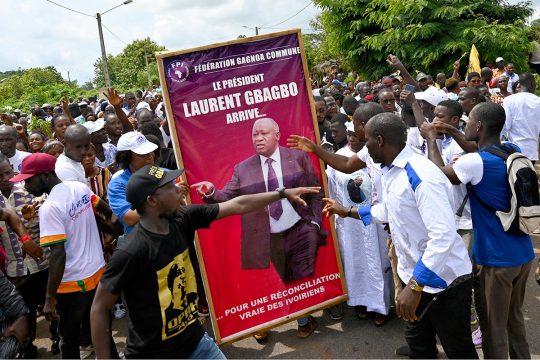President Alassane Ouattara, the winner of Côte d’Ivoire’s October presidential election, should use his second term to address the profound human rights challenges that have contributed to the country’s past violence, Human Rights Watch said in a report released today.
The 77-page report, “‘To Consolidate This Peace of Ours’: A Human Rights Agenda for Côte d’Ivoire,” assesses the government’s progress in strengthening the rule of law and identifies the key human rights priorities for the next five years. Ouattara’s government has made progress in addressing the consequences of the devastating 2010-2011 post-election crisis. But it should do more to fight impunity, strengthen the rule of law, complete security sector reforms, and find a lasting and rights-based solution to the land disputes that are frequently at the root of local-level violence.
“President Ouattara’s second term will likely define his legacy,” said Jim Wormington, West Africa researcher at Human Rights Watch. “Although his government deserves credit for reviving the economy, he will be ultimately judged on whether he tackles the entrenched problems that undermine human rights and threaten future stability.”
The largely peaceful October election and strong economic growth during President Ouattara’s first term have led many to praise the country’s recovery from its turbulent past. But Côte d’Ivoire is still less than five years removed from a decade of conflict and unrest, culminating in the refusal of then-president Laurent Gbagbo to cede power to Ouattara after the 2010 election. In the resulting armed conflict, 3,000 civilians were killed and scores of women raped.
Human Rights Watch found that Côte d’Ivoire has made significant process since Ouattara came to power, including through improved security countrywide. But in many cases, the positive steps taken were only beginning of a long road to meaningful reform.
The government has supported a special unit of judges and prosecutors to investigate atrocities committed during the 2010-2011 violence. In 2015, the unit indicted high-level suspects from both sides of the military-political divide. However, victims remain skeptical as to whether the government will ultimately support the trial and, if necessary, sentencing of commanders from pro-Ouattara forces. One victim said, “It’s the party who wins that writes its history.”
Similarly, while the government has made progress in improving the conduct of the military and transferring responsibility for law enforcement from the armed forces to police and gendarmes, the authorities have been slow to crack down on extortion, bribery, and corruption. Soldiers, police, and gendarmes extort money at illegal checkpoints, while several army commanders have enriched themselves through extortion, smuggling, and parallel tax systems targeting the exploitation of natural resources. The government should strengthen the beleaguered military justice system and adopt a zero-tolerance policy for security forces abuses.
Ivorians also told Human Rights Watch that in some cases the reforms during President Ouattara’s first term failed to properly address more deep-rooted issues.
Although the government has rebuilt courts and prisons destroyed or damaged during the country’s successive crises, many of the underlying and less visible problems that have plagued the justice system for decades remain untouched. Improving the independence of the judiciary should be a priority. One international justice expert told Human Rights Watch recently that the government has a “lack of desire to change the level of control that the executive currently has over judges.” The meager budget for the justice system should also be increased. In 2014, it was 90.6 million euros (US$96.4 million), just 1.4 percent of the country’s budget.
The government has refused to publish the final report of the Commission on Dialogue, Truth, and Reconciliation, which Ouattara established in 2011 and was envisioned to help prevent future abuses. An initial round of compensation to thousands of victims, awarded before the reparations commission makes final decisions about who is entitled to reparations and what they will receive, has raised expectations among other victims that the government may struggle to meet. The passage of a reparations law and increased outreach to victims are essential.
Furthermore, although Ouattara’s government recognizes the role of land conflicts in fomenting intercommunal violence, particularly in the country’s volatile west, the government has focused on implementing a 1998 rural land law that is too complicated and too expensive to enforce. Only 978 certificates – which provide customary landowners with a record of their property rights – had been issued by May 2015, out of an estimated 500,000 needed to cover Côte d’Ivoire.
The responsibility for resolving land disputes currently falls on local authorities and customary leaders who at times struggle to enforce their decisions, often discriminate against women, and frequently allow even those who occupied land in bad faith to remain on the land. A planned consultation on a new land policy should incorporate input from men and women from all political and ethnic groups.
“While President Ouattara has distanced himself from his country’s painful past, the road to recovery is a long one,” Wormington said. “Unless Ouattara addresses the rights challenges that evaded him during his first term, the fight to succeed him could once again threaten the peace on which Côte d’Ivoire’s recovery has been built.”





